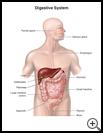
Upper GI Bleeding
________________________________________________________________________
KEY POINTS
- Upper GI bleeding is bleeding from the esophagus (the tube that carries food from your throat to your stomach), the stomach, or the first part of the small intestine.
- If the bleeding is mild, your healthcare provider may prescribe medicine to treat irritation in your esophagus. If the bleeding is severe, you will be treated in the emergency room and hospital.
- Ask your healthcare provider how long it will take to recover, and how to take care of yourself at home.
________________________________________________________________________
What is upper GI bleeding?
Upper GI bleeding is bleeding from the esophagus (the tube that carries food from your throat to your stomach), the stomach, or the first part of the small intestine. Bleeding from any of these areas may cause blood in the vomit or black, sticky bowel movements.
What is the cause?
Common causes of upper GI bleeding are:
- An ulcer in your stomach or upper intestine
- Irritation of your stomach or esophagus
- Nonsteroidal anti-inflammatory medicines (NSAIDs), such as aspirin, ibuprofen, and naproxen
- Long-term liver disease (cirrhosis)
- Injury to your upper digestive system
Sometimes the esophagus bleeds because it is torn after forceful coughing or vomiting.
Rarely, cancer of the stomach or esophagus may cause vomiting of blood.
What are the symptoms?
Symptoms depend on the cause of the bleeding and may include:
- Vomit that is bloody or looks like coffee grounds
- Heartburn-like pain (a burning pain or warmth in your chest, behind the breastbone)
- Stomach pain
- Black, tarry bowel movements
How is it diagnosed?
Your healthcare provider will ask about your symptoms and medical history and examine you. Tests may include:
- Blood tests
- A test to look for blood in your bowel movements
- An X-ray exam of your esophagus or stomach (barium X-ray exam)
- An upper endoscopy, which uses a long, flexible tube and tiny camera passed through your mouth and down into your stomach and upper intestine to look for causes of bleeding
You may need other tests, depending on how severe the bleeding is.
How is it treated?
The treatment for upper GI bleeding depends on its cause, your symptoms, your overall health, and any complications you may have. The goals are to stop the bleeding and to find and treat the cause of the bleeding.
If the bleeding is mild (occasional or small amount), your healthcare provider may prescribe medicine to:
- Treat the cause of the bleeding
- Treat or prevent an infection
- Replace iron lost from bleeding
- Prevent nausea and vomiting
If the bleeding is severe, you will be treated in the emergency room and hospital. A tube may be passed through your nose or mouth down into your stomach. The tube may be used to remove the blood from your stomach or give medicine. Your provider can also use the tube to get samples of stomach fluids to see if the bleeding has stopped.
If you have lost a lot of blood, you may need a blood transfusion.
If you have severe bleeding in your esophagus that cannot be stopped, you may have procedure called a balloon tamponade. A tube with a balloon at the end is put into your esophagus where the bleeding is. The balloon is filled with air and the pressure of the filled balloon stops the bleeding.
In rare cases, you may need surgery to treat the bleeding.
How can I take care of myself?
Follow the full course of treatment prescribed by your healthcare provider. In addition:
- Take your medicines exactly as prescribed and follow any special diets your provider recommends.
- Ask your provider if you should avoid NSAIDs. These drugs may cause stomach bleeding and other problems. These risks increase with age. Read the label and take as directed. Unless recommended by your healthcare provider, you should not take these drugs for more than 10 days.
- Ask your provider about all of your medicines including any blood thinners you take that may increase the risk of bleeding.
- You may need to stop smoking or stop drinking alcohol because nicotine and alcohol irritate the stomach.
Ask your healthcare provider:
- How and when you will get your test results
- How long it will take to recover
- If there are activities you should avoid and when you can return to your normal activities
- How to take care of yourself at home
- What symptoms or problems you should watch for and what to do if you have them
Make sure you know when you should come back for a checkup. Keep all appointments for provider visits or tests.
How can I help prevent GI bleeding?
Tell your healthcare provider if you often have stomach pain, heartburn, or acid indigestion.
Make sure to talk to your provider if you take NSAIDs daily. Do not take NSAIDs at higher doses or for longer than recommended.
If you drink a lot of alcohol, you are at high risk for liver disease and problems with your esophagus and stomach. Get help for your drinking. There are many places where you can get help, such as clinics, Alcoholics Anonymous, and support groups. Your healthcare provider can also help you find resources to quit drinking and to recover from problems caused by alcohol.

